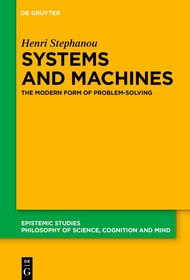
Systems, Machines, and Problem-Solving
The Modern Form of Problem-Solving
Series: Epistemic Studies; 55;
- Publisher's listprice EUR 139.95
-
58 044 Ft (55 280 Ft + 5% VAT)
The price is estimated because at the time of ordering we do not know what conversion rates will apply to HUF / product currency when the book arrives. In case HUF is weaker, the price increases slightly, in case HUF is stronger, the price goes lower slightly.
- Discount 5% (cc. 2 902 Ft off)
- Discounted price 55 142 Ft (52 516 Ft + 5% VAT)
Subcribe now and take benefit of a favourable price.
Subscribe
58 044 Ft

Availability
Not yet published.
Why don't you give exact delivery time?
Delivery time is estimated on our previous experiences. We give estimations only, because we order from outside Hungary, and the delivery time mainly depends on how quickly the publisher supplies the book. Faster or slower deliveries both happen, but we do our best to supply as quickly as possible.
Product details:
- Edition number 1
- Publisher De Gruyter
- Date of Publication 20 October 2025
- ISBN 9783111492575
- Binding Hardback
- No. of pages386 pages
- Size 230x155 mm
- Weight 500 g
- Language English
- Illustrations 4 Illustrations, black & white; 10 Illustrations, color; 2 Tables, black & white 700
Categories
Short description:
This series is devoted to publishing books in the fields of epistemology, philosophy of mind, philosophy of language, and philosophy of science. It is an outstanding platform for state of the art contributions. The studies are carried out in an argumentative style and advance current debates in a significant manner. While the main publication language is English, we also welcome German language submissions. All books are peer-reviewed.
MoreLong description:
The notion of problem solving has become central to science education and the cognitive sciences, but it is still peripheral to many philosophies of knowledge and science. In fact, the term only became popular in the course of the twentieth century, as humanity’s ability to solve theoretical and practical problems grew at a seemingly exponential rate. This book questions both the nature of problem solving and its effectiveness in transforming our human practices. We argue that this is linked to the idea that some of our enquiries can be summarized in systematic procedures. Examples are the proof of a theorem within an axiomatic theory, a production line within an industrial factory, or an administrative procedure within a bureaucratic system. Although such a form has been common in mathematics since antiquity, it was only in modern times that the possibility of being systematic in the natural sciences and technical disciplines was discovered. The emergence of the modern concepts of system and machine was key to this expansion and to the scientific, industrial and digital revolutions. Problem solving thus appears as the fundamental form of the modern concept of knowledge.
More




